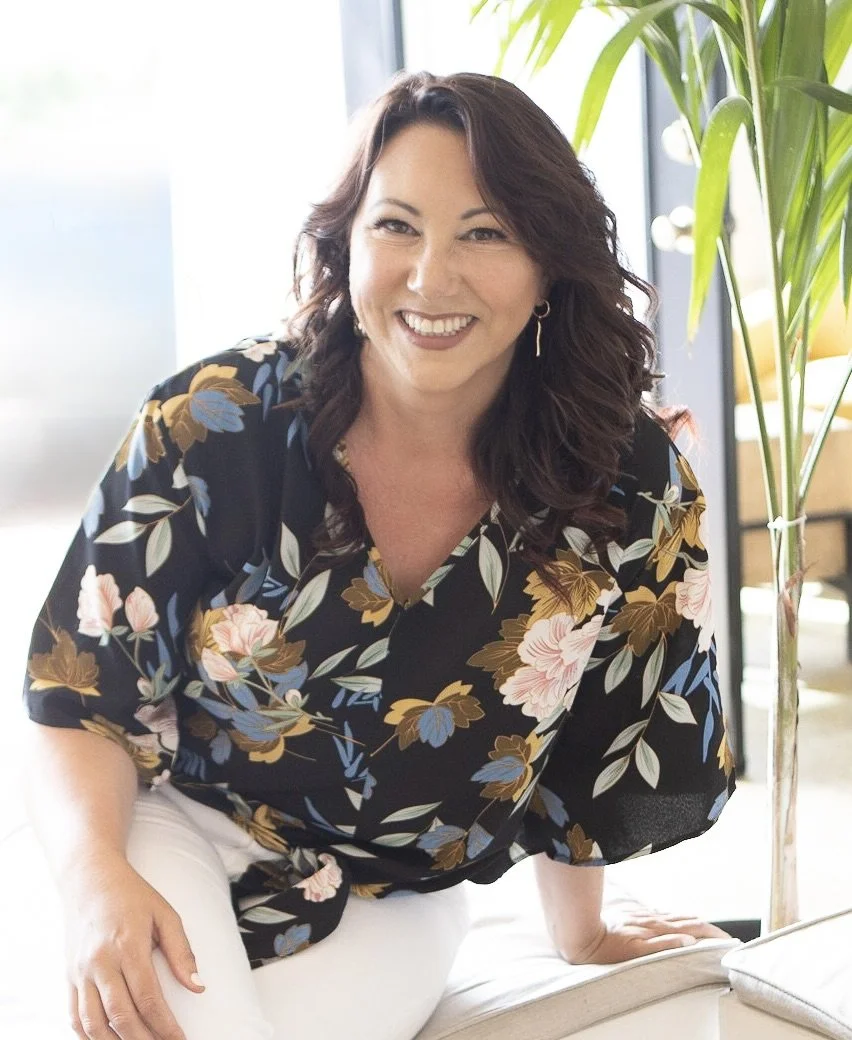Why Your Comfort Zone Shrinks After Divorce (And How to Fix It)
Based on my conversation with divorce coach Julie Danielson, who transformed her own life after divorce at 37 and now helps women do the same.
This week’s podcast guest—Julie Danielson.
Remember COVID lockdowns? That feeling when going to the grocery store suddenly felt terrifying? When restaurants seemed overwhelming? When your entire world had condensed into the four walls of your home?
That's what can happen to your comfort zone after divorce - except nobody's mandating it. You're doing it to yourself.
Julie Danielson, founder of Get Over Divorce, sees this pattern constantly with the women she coaches. "Your comfort zone can shrink," she explains. "I remember COVID. We don't want to talk about it, but remember that time we all were at home and we were isolating and not getting out... I remember my comfort zone shrunk so much there came a point where I feared going out to the grocery store."
The same thing can happen after divorce if you aren’t intentional about stretching yourself. And it's even more insidious because it happens gradually, without you noticing.
Why Divorce Makes Your World Smaller
When you're going through a divorce, your instinct is often to pull inward. You're dealing with:
Emotional exhaustion from the separation process
Potential financial stress and uncertainty
Loss of identity (especially if you were a wife or caretaker for decades)
Fear of judgment from friends, family, or your community
Simply not knowing who you are anymore without your partner
So you stay home. You isolate. You tell yourself you're processing or healing or taking time for yourself.
But here's what Julie has learned after coaching hundreds of divorced women:
If you do not continually work on stretching your comfort zone, it will shrink. And you will isolate. And that is when women get depressed. That is when women feel stuck.
The Dangerous Comfort Zone Spiral
The comfort zone shrinkage happens in stages:
Stage 1: The Initial Withdrawal
You stop going to places you went as a couple. You avoid mutual friends. You decline invitations because you're "not ready" or "too tired."
Stage 2: The Routine Narrowing
Your world becomes work and home. Maybe the grocery store. Your social interactions become increasingly limited to safe, predictable encounters.
Stage 3: The Fear Sets In
Now even simple things feel daunting. Eating at a restaurant alone? Terrifying. Going to a movie by yourself? Unthinkable. Traveling solo? Absolutely not.
Stage 4: The Identity Crisis Deepens
You've lost yourself in your marriage, and now you're losing yourself in isolation. You literally don't know what you want anymore because you've stopped exposing yourself to new experiences that could help you figure it out.
Julie describes working with women who come to her "feeling really stuck and confused." When she asks them what they want, the answer is almost always the same: "I don't know."
They don't know because they've stopped exploring. They've let their comfort zone shrink so small that there's no room left for possibility.
How Travel Fixes a Shrinking Comfort Zone
This is where travel becomes not just helpful, but potentially life-changing.
Julie makes a critical distinction between two types of escapism after divorce:
Destructive Escapism:
Getting on Tinder and hooking up to fill the void
Drinking excessively
Overspending and shopping addiction
Numbing yourself with food
Taking a vacation where you just drink on a beach
Productive Escapism:
Travel that feeds your soul
Experiences that get you out of your comfort zone
Immersion in different cultures and perspectives
Activities that challenge you to grow
"Travel feeds your soul," Julie explains. "It's healing. It is getting you out of your comfort zone and immersing you in somewhere that is completely different."
Julie's own transformative moment came at 37, in the middle of her divorce, when she decided to take part of her master's degree program in Austria for two weeks. "It was mostly schoolwork, but it was also very soul filling to get away and be immersed in a totally different culture and situation."
She loved it so much, she went back and did it again after her divorce was finalized.
Starting Small: You Don't Have to Book a Flight to Europe Tomorrow
One of the things I love about Julie's approach is that she doesn't expect women to immediately book solo trips to foreign countries. She has a list of 100 things women can do to stretch their comfort zone, and they start small.
Baby Steps to Rebuild Your Comfort Zone:
Eat at a restaurant by yourself - This is often the first challenge. Just you, a book or your phone, and a meal in public. It's a baby step toward solo travel.
Go to a movie alone - Another small but meaningful step in reclaiming your independence.
Take a day trip to a nearby town - Explore somewhere close by, completely on your own schedule and terms.
Join a class or group activity - Pottery, painting, hiking groups, book clubs - anything that gets you out and around new people.
Say yes to one invitation you'd normally decline - Start rebuilding your social connections, even when it feels uncomfortable.
The goal isn't to do something extreme. One of Julie's clients went skydiving, which Julie loved, but she doesn't require that level of adventure. The goal is consistent, intentional expansion of what feels comfortable.
The Confidence Feedback Loop
Here's what happens when you start stretching your comfort zone through travel and new experiences:
You try something scary → You survive it (and maybe even enjoy it) → Your confidence grows → You're willing to try something slightly scarier → Repeat
I've seen this transformation repeatedly with the divorced women who travel with my groups. Women who had never flown alone at 50 years old. Women whose husbands had always handled all the logistics and navigation. Women who didn't know they could make decisions without consulting a partner.
A couple of years later, these same women are confidently navigating international airports, booking their own trips, and traveling solo between my group trips.
The confidence they gain from travel bleeds into every other area of their lives - their careers, their relationships, their willingness to advocate for themselves.
Beyond Time: Why Intentional Work Matters
Julie debunks one of the most common myths about divorce recovery: "Time heals all wounds."
"I don't believe that's true," she says firmly. "Time heals flesh wounds, but it's the emotional wounds that take more than time. It takes intentionally looking at those areas of your life and going to work on them."
You can't just wait out your divorce recovery. You can't sit at home for a year and expect to emerge transformed. Healing requires action.
This is why Julie created her THRIVE process for working with divorced women:
T - Transform and heal your emotions
Learn to actually manage your feelings instead of being controlled by them.
H - Heal and grow from the lessons of your past
Understand what your marriage taught you so you don't repeat the same patterns.
R - Reclaim your power
Learn to say no, set boundaries, stop people-pleasing, and put yourself first.
I - Increase confidence
Build self-trust so you know you can make good decisions for yourself.
V - Vision for your future
Create clear goals and dreams - your north star for moving forward.
E - Empowered action
Take consistent steps toward those goals and dreams.
Notice that every single step requires action. Intentional, sometimes uncomfortable action.
What Happens If You Don't Stretch Your Comfort Zone
I've seen the alternative in divorce Facebook groups I used to participate in. These groups were full of women stuck in their pain, sometimes years after their divorces were finalized.
Julie encountered this too - she spoke with a woman whose divorce had been finalized 12 years ago, and all she wanted to do was talk about how her ex ruined her life and why she no longer had relationships with her adult children.
"Maybe sit in your pity party for a little while," Julie says. "But then there has to be a point where you take responsibility for the rest of your life going forward. And if you don't do that, then you're just sitting in that pit of misery forever."
The women who stay stuck are the ones who never stretched their comfort zones. They let fear win. They chose familiar misery over uncomfortable growth.
Your Comfort Zone Action Plan
If you're reading this and recognizing yourself in the shrinking comfort zone pattern, here's how to start reversing it:
This Week:
Do one thing alone that you'd normally avoid (restaurant, coffee shop, movie)
Accept one social invitation you'd normally decline
Take a walk in a new neighborhood or park
This Month:
Plan a day trip to somewhere within driving distance
Try one new activity or class
Reach out to three people you've been avoiding
This Quarter:
Book a weekend getaway (solo or with a friend)
Start a vision board with travel destinations
Research one international trip that excites and terrifies you
This Year:
Take that international trip
Establish a regular practice of doing things outside your comfort zone
Evaluate how much your world has expanded
The Bottom Line
Your comfort zone after divorce doesn't have to keep shrinking. But it won't expand on its own either.
As Julie puts it: "Get outside. Like anything you do, getting out your front door and take a walk, go to a park, get a new dog, do the things that is gonna get you out and connecting with other people. Because it is in that isolation that we kind of go inward on ourselves and it becomes negative."
Divorce isn't just an ending. It's a beginning - but only if you're brave enough to step outside the increasingly small box you've built around yourself.
The world is still out there, waiting for you to explore it. Your comfort zone can expand. Your confidence can rebuild. Your life can be bigger and more fulfilling than it was before.
But first, you have to take that first uncomfortable step.
Resources:
Learn more about Julie Danielson's work at getoverdivorce.com
Listen to the full podcast episode on Type 2 Travel
Join Julie's Facebook group: Thriving Community: Women Supporting Women Through Divorce
Ready to stretch your comfort zone through travel? Check out my upcoming group trips designed for women who want to explore the world with supportive, like-minded travelers.


